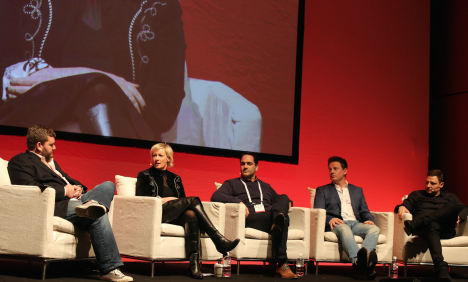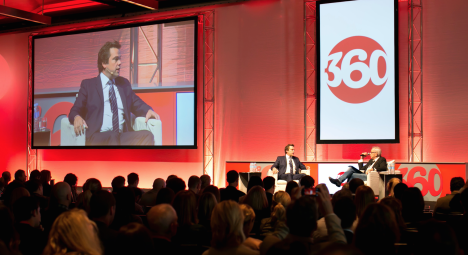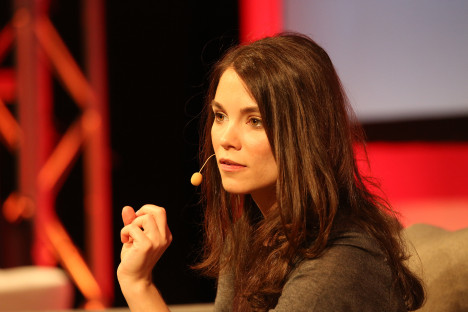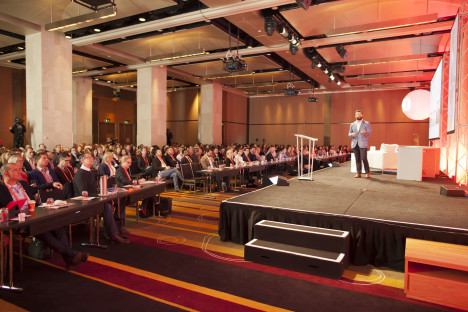How collaboration saved our bacon (and your invitation to be part of the next Mumbrella360)
 Mumbrella today launches its annual call for speakers and session proposals for Mumbrella360. Last week Tim Burrowes shared the story of Mumbrella360 in a presentation at the annual Professional Conference Organisers Association annual conference. This post is based on that talk.
Mumbrella today launches its annual call for speakers and session proposals for Mumbrella360. Last week Tim Burrowes shared the story of Mumbrella360 in a presentation at the annual Professional Conference Organisers Association annual conference. This post is based on that talk.
By the time you finish reading this, you may well decide that I’m less qualified to talk about organising events than anybody else in the events industry.
Back in February 2011, We decided to hold a conference… With four months notice.
And somewhat ambitiously, we decided that from year one, we wanted it to be the biggest media and marketing conference in Australia.
I don’t mean four months from going on sale. I mean four months from starting work on the conference.
As any events professional would be aware, this would seem like a very bad idea.
Luckily, at the time we weren’t really events people. Or we’d have realised that… and we wouldn’t have done it.
But I say luckily, because, by the skin of our teeth, it worked. And if we’d done it in a more traditional way, then I actually don’t think it would have happened at all.
It’s possible now to post-rationalise that it was all a cunning plan. The truth is though, we made it up as we went along, and the collaboration was what saved our bacon.
Today Mumbrella turns seven years old. And the engine for our growth has been Mumbrella360.
And there were a few principles we applied right from the start…
The most important thing was that we decided to build the process collaboratively and transparently.
We wanted it to be an event that put collaboration right at the centre of the curation process, and was very obvious about it.
So we booked a couple of floors of the Hilton in Sydney, took a big gulp, and went for it.
I launched it by writing a blog post. I told our readers what we were planning, and asked them to be involved.
As we have done every year since – including today’s call for 2016 collaborations – we invited them to suggest one of two things: either their proposal for what they’d do with a 45 minute time slot. Or to simply put themselves forward as a speaker.
We were planning four streams of content on both of the days, so we knew that we had about 50 sessions available.
Our thinking was that many of our readers are cleverer, more creative and better connected than we are. So they’d have better ideas for sessions than we would. They’d know the hot topic in their niche better than we would. And they’d be able to get speakers that we couldn’t.
And what’s in it for them is a chance to show potential clients how clever they are.
Hopefully it would make for fewer panels consisting of four middle-aged white males pontificating. And more sessions with new formats and unusual speakers.
Although it took a few years to nail down my own thinking about what the purpose of the conference was, our collaborators got it before I did.
It was – and is – to offer an opportunity for any person who works in any area of the communications industry to come away with an overview of the most interesting issues in all the bits of the business that they’re not necessarily involved with every single day.
We want them to go in a specialist and come out a generalist as well.
And we always wanted readers to feel like we were in it together. We emphasised the genuine risk involved in doing it this way. As it progressed, we were honest about the stress the team was under, and the hours of sleep that were being lost.
The next stage was also transparent. But, if I’m totally honest, cynically transparent (if you can have such a thing).
We put all of the proposals – about 100 or so – into a single document. It was thousands of words.
And we turned that into an online survey, which all of our readers could look at, and vote for the sessions and speakers they wanted to hear.
A lot of people clicked on it, took a bit of a look, got daunted and gave up. A smaller number actually did the voting. And I think, many of those may well have been interested parties.
But the point was that it was a subtle way of demonstrating to our readership that there had been this huge response.

It helped us dig out the sessions of most interest to our readers – and potential delegates. And of course, those that sounded like sales pitches didn’t get the votes.
I then began to put together the program, slotting in the sessions chosen by the readers, along with a few captain’s picks of my own.
So we started to announce the sessions, and of course each time we did, we sold some tickets.
Alongside this collaborative effort, we were also undertaking some of the more traditional event curation efforts.
In particular, I was working my relationships to land the right keynote. With about three months to go, we were able to announce that Richard Freudenstein, CEO of The Australian, and of News Digital Media, would be making his only public appearance of the year.
And we were able to agree a form of words that dropped a hefty hint that he’d be using the event to announce News Corp’s paywall strategy.
For the second day, I was able to balance this media keynote with a marketing one, featuring the new local chief marketing officer of Unilever, Peter Boone.
Over the years, other bigwigs we’ve managed to snare have included the likes of Nine boss David Gyngell, the week he’d saved the network from going into administration.
We got him by asking the boss of Group M, John Steedman, who he would like to interview on stage. When you manage a two billion dollar ad spend, you’re harder to say ‘no’ to than I am.
We got Lachlan Murdoch the same way, just after he came back to the helm of News Corp.
And we got Hamish McLennan as the new boss of Channel Ten.
Plus loads of radio stars over the years like Merrick, Rosso, Jonesy, Amanda, Fitzy, Wippa, Paul Murray, Ben Fordham and more. (This year’s radio panel – curated by Commercial Radio Australia – scored some of the highest delegate feedback we’ve seen to date.)

And we’ve had some great international speakers from the likes of BuzzFeed, MTV and Twitter among others.
But the sessions that came through the collaborative submissions process were some of the most interesting – and risky.
![]() For instance, we worked with media agency PHD who created a real time collaboration session in which by the end, the participants had drawn up a manifesto for the media industry, against the clock.
For instance, we worked with media agency PHD who created a real time collaboration session in which by the end, the participants had drawn up a manifesto for the media industry, against the clock.
You can imagine the logistics of that. We then published the results on Mumbrella afterwards.
In later years, PHD became a stalwart, including organising a couple of game show format panels on the future of the media.
 At the last 360, another top scoring session came from Cummins & Partners, telling the story of I Bought A Jeep.
At the last 360, another top scoring session came from Cummins & Partners, telling the story of I Bought A Jeep.
Meanwhile, other regular collaborators include – as I’ve mentioned – Group M. Each year, they’ve curated a whole day of content, called The M Grad Project, just for students interested in entering the industry, who get free places.

 This is John Dawson, who now works at Mindshare.
This is John Dawson, who now works at Mindshare.
He dropped me an email four years ago, asking for advice on how to get into the industry.
I suggested he come along to the M Grad stream, where he was talent spotted and given an internship. Now he’s one of Australia’s most awarded young strategists. And I strongly suspect he’s going all the way to the top. Although I’m sure he would have made it without any help from us, I’m proud we helped GroupM find him.
Another memorable speaker from last year, was Mel Greig, the radio DJ involved in the prank call on the nurse. She appeared on a panel called Winning By Losing curated by ZenithOptimedia, where speakers discussed their worst moment and what they’d learned from it.
And another thing we introduced a couple of years back was an extra classroom stream, off the side of the conference, featuring short and sharp, really practical career-based sessions.
As I say, we try to be transparent with our audience about how it all works. Unlike many in our industry, we don’t generally allow sponsors to pay to speak at our events. This is so our audience knows that everybody they see are on stage because we think they’re the very best qualified to talk on the topic. And we try to rigorously police the “no sales pitches” rule.
If people do sell, it shows up in the feedback forms, and they don’t get invited back.
But there are half a dozen, transparent exceptions. We sell some platinum sponsorships, where the sponsor gets to run the whole session. We promote it as a sponsor-presented session, and it depends entirely on how intriguing the title is, how good the panel is, and how well they promote it against the other sessions on whether anybody comes along.
On the feedback forms, sponsor sessions have previously been among our top scoring sessions. (And admittedly, among our lowest scoring, when done badly.)
Another thing we do to try to encourage that collaborative, buzzy feel at the event, is to put up posters everywhere, promoting all of the sessions. We make some ourselves, sponsors can do the same, and so can our other session curators.
And this is where I diverge from last week’s PCOA presentation to talk about Mumbrella360 in 2016.
If you scoot over to the Mumbrella360 website, you’ll see that we are once again inviting session proposals.
As ever, we’re looking for two types of proposal. Either simply putting yourself forward to speak, along with details of what you’ve got to say. We might then invite you to participate either as a solo speaker or as a panellist.
Or secondly, put forward a proposal to curate a session. In that case, it’s good to give as much detail as possible on how the session will be formatted. We like sessions that go beyond a typical panel format.
We’d also like to know the speakers you plan to involve in the session. You may not have them 100% locked in, but at the very least, you should have their agreement in principle to appear, and the dates should be in their diary.
In terms of speaker mix on panels, it’s worth being aware that if you put forward a 100% male panel, it is less likely to get up.
Most important though, is having a clear understanding of what the audience will get out of it: will they go back to work with a better picture of what the cutting edge thinking is in your corner of the media and marketing world?
Don’t rush to answer that. We’ll leave submissions open until Friday February 5.
I look forward to collaborating.
- Tim Burrowes is the content director of Mumbrella and curator of Mumbrella360. Collaboration proposals for next year’s conference can be submitted here.















 Linkedin
Linkedin